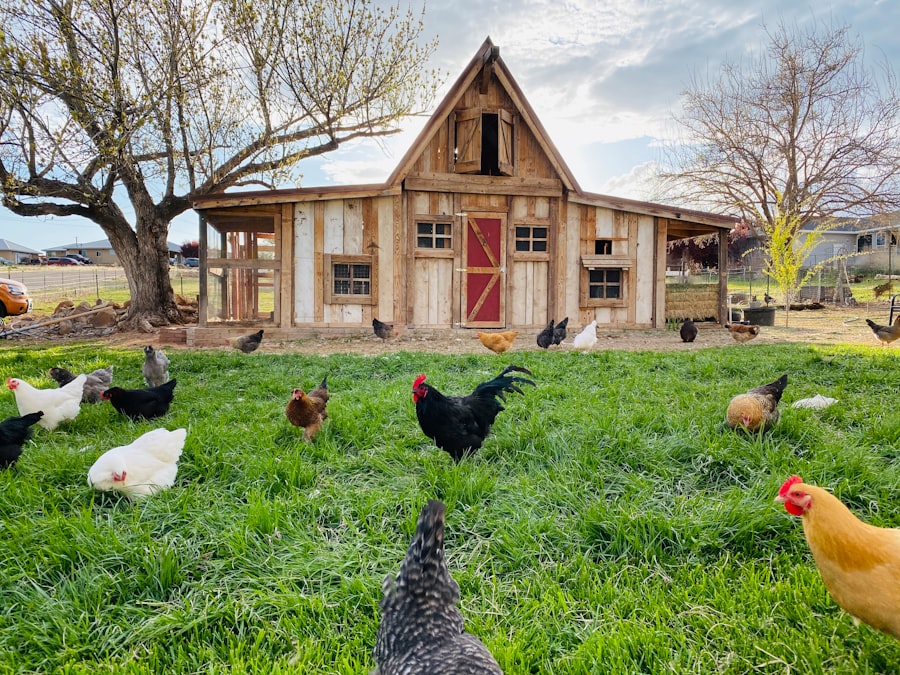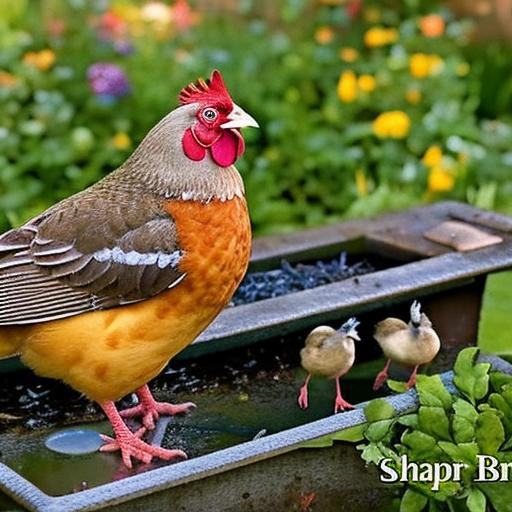Keeping chickens in your garden can be a rewarding and fulfilling experience. Not only do they provide fresh eggs, but they also offer natural pest control and fertilizer for your garden. Having chickens in your backyard can also be a great educational opportunity for children and a way to connect with nature. In this article, we will explore the benefits of keeping chickens in your garden and provide tips on how to successfully raise and care for them.
Key Takeaways
- Keeping chickens in your garden can provide fresh eggs, natural pest control, and fertilizer for your plants.
- It’s important to research and follow local laws and regulations for raising chickens in your area.
- Different breeds of chickens have different personalities, egg-laying abilities, and space requirements, so choose wisely.
- Building a secure coop, run, and fencing is crucial for keeping your chickens safe from predators and preventing them from damaging your garden.
- Providing a balanced diet, clean water, and proper care can help keep your chickens healthy and happy.
The Benefits of Keeping Chickens in Your Garden
One of the main benefits of keeping chickens in your garden is the abundance of fresh eggs they provide. There is nothing quite like collecting eggs from your own backyard and knowing exactly where they came from. Fresh eggs are not only delicious, but they are also more nutritious than store-bought eggs. Chickens that are allowed to roam freely in your garden will have access to a variety of plants and insects, resulting in eggs that are higher in omega-3 fatty acids and vitamins.
Another benefit of having chickens in your garden is their natural pest control abilities. Chickens love to eat insects, slugs, and snails, which can be a nuisance in the garden. By allowing chickens to roam freely, they will help keep these pests under control without the need for harmful pesticides. Additionally, chickens will also eat weeds and grass, helping to keep your garden tidy.
Chickens also provide a valuable source of fertilizer for your garden. Their droppings are rich in nitrogen, phosphorus, and potassium, which are essential nutrients for plant growth. By allowing chickens to roam freely in your garden or by using their droppings as compost, you can improve the health and fertility of your soil.
Understanding Local Laws and Regulations for Raising Chickens
Before you decide to keep chickens in your garden, it is important to understand and comply with local laws and regulations. Many cities and towns have specific rules regarding the number of chickens you can keep, the size and location of coops and runs, and the distance from neighboring properties. Some areas may also require permits or licenses for keeping chickens.
To research local laws and regulations, start by contacting your local government or zoning department. They will be able to provide you with information on any restrictions or requirements for keeping chickens in your area. It is also a good idea to reach out to other backyard chicken keepers in your community to learn about their experiences and any challenges they have faced.
Once you have a clear understanding of the local laws and regulations, it is important to comply with them. This may involve obtaining any necessary permits or licenses, ensuring that your coop and run meet the required specifications, and keeping the appropriate number of chickens. By following the rules, you can avoid any potential fines or legal issues.
Choosing the Right Breeds of Chickens for Your Garden
When it comes to choosing the right breeds of chickens for your garden, there are several factors to consider. Different breeds have different characteristics, such as egg production, temperament, and size. It is important to choose breeds that are well-suited to your specific needs and environment.
If you are primarily interested in egg production, there are several breeds that are known for their high egg-laying capabilities. Breeds such as Rhode Island Reds, Leghorns, and Sussex are known for their consistent egg production. On the other hand, if you are looking for chickens that are good for meat production, breeds such as Cornish Cross or Plymouth Rocks may be more suitable.
Temperament is another important factor to consider when choosing breeds. Some breeds are known to be more docile and friendly, while others may be more flighty or aggressive. If you have children or plan to interact with your chickens frequently, it is important to choose breeds that are known for their calm and friendly nature.
Size is also a consideration, especially if you have limited space in your garden. Some breeds, such as Bantams or Silkies, are smaller in size and require less space than larger breeds. It is important to choose breeds that are appropriate for the size of your garden and the amount of space you have available for a coop and run.
Preparing Your Garden for Chickens: Coops, Runs, and Fencing
Before bringing chickens into your garden, it is important to prepare the necessary infrastructure to keep them safe and secure. This includes building a coop, run, and fencing.
A coop is a shelter where chickens can sleep, lay eggs, and seek protection from predators and the elements. It should be well-ventilated, secure, and provide enough space for the number of chickens you plan to keep. The coop should also have nesting boxes where chickens can lay their eggs and roosting bars where they can perch at night.
A run is an enclosed area where chickens can roam freely during the day. It should be large enough to allow chickens to exercise and explore, but also secure enough to keep them safe from predators. The run should be covered with wire mesh to prevent chickens from escaping or being attacked by predators.
Fencing is an important component of keeping chickens in your garden. It helps to keep chickens contained within their designated areas and prevents them from wandering into neighboring properties or becoming prey to predators. The fencing should be sturdy and tall enough to prevent chickens from flying over or predators from digging under.
Feeding and Caring for Your Chickens: Tips and Tricks

Feeding and caring for your chickens is an important aspect of keeping them healthy and happy. Chickens require a balanced diet that includes a combination of commercial feed, kitchen scraps, and fresh water.
Commercial feed is formulated specifically for chickens and provides them with the necessary nutrients they need to thrive. There are different types of feed available, including starter feed for young chicks, grower feed for adolescent chickens, and layer feed for hens that are laying eggs. It is important to choose a high-quality feed that is appropriate for the age and breed of your chickens.
In addition to commercial feed, chickens can also be fed kitchen scraps and garden waste. They enjoy a variety of fruits, vegetables, grains, and protein sources such as cooked meat or insects. However, it is important to avoid feeding them anything that is toxic or harmful to their health, such as chocolate, onions, or avocado.
Fresh water is essential for chickens to stay hydrated and healthy. Make sure to provide clean water in a shallow dish or waterer that is easily accessible to the chickens. It is important to check the water regularly and refill it as needed.
Caring for your chickens also involves keeping their coop clean and providing them with a comfortable environment. Regularly clean out the coop and remove any droppings or soiled bedding. This will help prevent the buildup of bacteria and parasites that can cause health issues for your chickens. Provide fresh bedding such as straw or wood shavings to keep the coop clean and comfortable.
Health and Safety Considerations for Your Garden Chickens
Keeping your chickens healthy and safe is crucial for their well-being. There are several health and safety considerations to keep in mind when raising chickens in your garden.
One of the most important aspects of chicken health is disease prevention. Chickens can be susceptible to various diseases, such as respiratory infections, parasites, and bacterial infections. To prevent the spread of disease, it is important to practice good biosecurity measures. This includes keeping the coop clean, quarantining new chickens before introducing them to the flock, and regularly checking for signs of illness.
Regular veterinary care is also important for maintaining the health of your chickens. Find a veterinarian who specializes in poultry or small animals and schedule regular check-ups for your flock. They can provide vaccinations, perform health checks, and offer advice on preventing and treating common chicken health issues.
Another important aspect of chicken health is predator prevention. Chickens are vulnerable to predators such as raccoons, foxes, and hawks. To keep your chickens safe, make sure the coop and run are secure and predator-proof. This includes using sturdy fencing, covering the run with wire mesh, and providing a secure lock on the coop.
Managing Chickens and Other Garden Wildlife
Managing chickens and other garden wildlife can be a delicate balance. While chickens can help control pests in the garden, they can also be vulnerable to predators and pests themselves.
To protect your chickens from predators, it is important to secure the coop and run with sturdy fencing and wire mesh. Make sure there are no gaps or holes that predators can squeeze through or dig under. It is also a good idea to provide a covered area in the run where chickens can seek shelter from aerial predators such as hawks.
In addition to predators, chickens can also be susceptible to pests such as mites, lice, and worms. Regularly inspect your chickens for signs of infestation, such as feather loss, irritation, or weight loss. If you suspect your chickens have pests, consult with a veterinarian who can recommend appropriate treatment options.
Harvesting Fresh Eggs from Your Garden Chickens
Harvesting fresh eggs from your garden chickens is one of the most rewarding aspects of keeping them. To ensure that eggs are fresh and safe to eat, it is important to follow proper harvesting and handling procedures.
Collect eggs daily to prevent them from becoming dirty or damaged. It is best to collect eggs in the morning when they are still fresh and cool. Gently clean any soiled eggs with a damp cloth or sponge, but avoid washing them with water as this can remove the protective bloom on the shell.
Store eggs in a cool and dry place, such as a refrigerator. It is best to store them with the pointed end down to help maintain their freshness. Fresh eggs can be stored for up to several weeks, but it is always a good idea to check the freshness by performing the float test. Fill a bowl with water and gently place the egg in it. If the egg sinks to the bottom and lays flat, it is fresh. If it stands upright or floats, it is no longer fresh and should be discarded.
Selling or Sharing Your Garden Chickens’ Eggs
If you have an abundance of eggs from your garden chickens, you may consider selling or sharing them with others. There are several benefits to selling or sharing your chickens’ eggs, including reducing waste, earning extra income, and building connections within your community.
Before selling or sharing eggs, it is important to check local laws and regulations regarding the sale of eggs. Some areas may require permits or licenses for selling eggs, while others may have specific labeling or packaging requirements. It is also important to ensure that your chickens are healthy and that the eggs are clean and safe to eat.
If you decide to sell eggs, consider setting up a small roadside stand or selling them at local farmers markets or community events. You can also reach out to friends, family, and neighbors who may be interested in purchasing fresh eggs. By selling or sharing your chickens’ eggs, you can not only enjoy the benefits of fresh eggs but also contribute to your local food economy.
Joining the Community of Backyard Chicken Keepers
Keeping chickens in your garden can be a wonderful way to connect with nature and join a community of like-minded individuals. There are many resources available for backyard chicken keepers, including online forums, social media groups, and local meetups.
Online forums and social media groups provide a platform for backyard chicken keepers to ask questions, share experiences, and learn from one another. These communities can be a valuable source of information and support, especially for new chicken keepers. You can find forums and groups dedicated to backyard chickens on websites such as BackyardChickens.com or Facebook.
Local meetups and events are another great way to connect with other backyard chicken keepers in your area. Check with your local agricultural extension office or community center for information on any upcoming events or workshops. Attending these events can provide an opportunity to learn from experienced chicken keepers, share tips and tricks, and build connections within your community.
Keeping chickens in your garden can be a rewarding and enriching experience. From fresh eggs to natural pest control, there are many benefits to having chickens in your backyard. By understanding local laws and regulations, choosing the right breeds, and providing proper care and housing, you can successfully raise chickens in your garden. Whether you are a seasoned gardener or just starting out, consider adding chickens to your garden and enjoy the many rewards they bring.
If you’re considering keeping chickens in your garden, you may also be interested in learning how to insulate a chicken coop. Proper insulation is crucial for maintaining a comfortable and healthy environment for your feathered friends, especially during colder months. Poultry Wizard offers a comprehensive guide on how to insulate a chicken coop, providing valuable tips and techniques to ensure your chickens stay warm and protected. Check out their article here for all the information you need to create a cozy home for your flock.
FAQs
Can you keep chickens in your garden?
Yes, you can keep chickens in your garden as long as you follow certain guidelines and regulations.
What are the guidelines for keeping chickens in your garden?
The guidelines for keeping chickens in your garden vary depending on your location. Generally, you need to provide adequate space, shelter, food, and water for your chickens. You also need to ensure that your chickens are not causing a nuisance to your neighbors.
Do you need a permit to keep chickens in your garden?
In some areas, you may need a permit to keep chickens in your garden. It is important to check with your local council or government to find out the regulations in your area.
How much space do chickens need in a garden?
Chickens need at least 4 square feet of space per bird in their coop and at least 10 square feet of outdoor space per bird. However, more space is always better for the health and well-being of your chickens.
What do chickens eat?
Chickens eat a variety of foods, including grains, vegetables, fruits, and insects. You can also feed them commercial chicken feed that is specifically formulated for their nutritional needs.
Do chickens make a lot of noise?
Chickens do make noise, but it is generally not as loud as other farm animals like cows or pigs. However, roosters can be quite loud and may disturb your neighbors if you live in a residential area.
What are the benefits of keeping chickens in your garden?
Keeping chickens in your garden can provide you with fresh eggs, natural fertilizer for your garden, and entertainment. Chickens are also great at controlling pests like slugs and snails.
Meet Walter, the feathered-friend fanatic of Florida! Nestled in the sunshine state, Walter struts through life with his feathered companions, clucking his way to happiness. With a coop that’s fancier than a five-star hotel, he’s the Don Juan of the chicken world. When he’s not teaching his hens to do the cha-cha, you’ll find him in a heated debate with his prized rooster, Sir Clucks-a-Lot. Walter’s poultry passion is no yolk; he’s the sunny-side-up guy you never knew you needed in your flock of friends!







